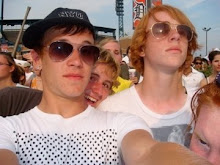 I came across the first volume in the series a few years ago after reading about it in Wizard and online. Initially, I wanted to see what the hype was all about. After years of disliking manga, I wasn't excited to jump into a series created in a similar format, and the volume ended up drifting onto a bookshelf, awaiting its time to be read. Sure enough, after about a year, I finally got around to opening the cover and jumping in.
I came across the first volume in the series a few years ago after reading about it in Wizard and online. Initially, I wanted to see what the hype was all about. After years of disliking manga, I wasn't excited to jump into a series created in a similar format, and the volume ended up drifting onto a bookshelf, awaiting its time to be read. Sure enough, after about a year, I finally got around to opening the cover and jumping in. The funny thing is, I just don't have all that much to say about this first volume because I feel like it's all so obvious. Bryan Lee O'Malley poured all of his geekiness and angst into this series, and it really reads like a passion product from a creator who can still edit himself (not to discredit any work that the fine folks at Oni Comics might have put into the editing process). Sure, O'Malley throws reference after reference at the reader and introduces world-building elements without much warning, but Scott Pilgrim succeeds where so many fan-service projects go wrong: there is a heart and soul to the story beyond the nerdiness.

The characterization displays this best. Scott is a lovable loser/slacker, but O'Malley puts him in situations that deepen his character. The awkwardness of dating a high schooler, the feeling of mediocrity with Sex Bob-omb, his... unique living situation, the dreams of a mysterious courier, and his night with Ramona all affect Scott in ways that lift him above a two-diminesional stereotype for a nerdy guy in his position in life. Wallace is another great example, as O'Malley plays some stereotypes up in a realistic way (teasing and flirting with "straight" characters) while showing Wallace's responsibility for and tolerance of Scott as well as his troublesome drinking habits. Aside from the alcoholism, I can attest that the relationship between Wallace and Scott is strikingly similar to the relationship I share with some of my close friends from home. The key to these characterizations is that O'Malley knows how to have some fun with it all, balancing character maturity with lighthearted moments and plenty of absurdly unreal additions.
 Think about it: is there any warning that Scott's dreams will be revealed to be a subspace portal, or that Matthew Patel will attack Scott with magical powers and summon demon hipster chicks? Up until the first instance, Scott Pilgrim could just be a winsome slice-of-life story for a Canadian slacker who likes to make video game references. But thanks to O'Malley's manic manga-inspired art style, these twists of absurdity just feel natural. I had an issue with Death Note because the supernatural elements felt too inorganic and much too easily accepted, but I would point toward Scott Pilgrim as an example of throwing in crazy plot elements without much explanation and having it all make sense. The art is a little rougher here than in later volumes (to be expected), but it's full of energy even when it seems to be cutting corners, and O'Malley never skimps on the action.
Think about it: is there any warning that Scott's dreams will be revealed to be a subspace portal, or that Matthew Patel will attack Scott with magical powers and summon demon hipster chicks? Up until the first instance, Scott Pilgrim could just be a winsome slice-of-life story for a Canadian slacker who likes to make video game references. But thanks to O'Malley's manic manga-inspired art style, these twists of absurdity just feel natural. I had an issue with Death Note because the supernatural elements felt too inorganic and much too easily accepted, but I would point toward Scott Pilgrim as an example of throwing in crazy plot elements without much explanation and having it all make sense. The art is a little rougher here than in later volumes (to be expected), but it's full of energy even when it seems to be cutting corners, and O'Malley never skimps on the action.With the impending Edgar Wright-helmed movie adaptation starring good 'ole non-actor Michael Cera, it's a great time to be a Scott Pilgrim fan. I mean, even a few years ago, volumes were hard to come by because of small print runs. I'm pretty sure the movie will be pretty good, but Michael Cera will just play Michael Cera like he always does, so prime reading season is anytime from now until August when you'll be unable to un-hear Michael Cera's voice every time you read any of Scott Pilgrim's dialogue. Get in before it's ruined, kids!


No comments:
Post a Comment